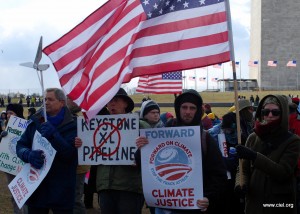
According to some of the most active and experienced environmental journalists in the United States, 2015 stands to bring a series of environmental face-offs, which will culminate in what one speaker timingly nicknamed the ‘Super Bowl of Climate Change’ in Paris this upcoming November.
The Woodrow Wilson Center hosted its third annual “Year Ahead in Environment and Energy” panel discussion on the afternoon of Friday, January 23, 2015—just days after President Obama assured environmentalists from Capitol Hill to Montana that addressing and combating climate change is on the top of his agenda. But will the President be able to deliver on US obligations to lead in the fight against climate change? Will the US bring a strategy that leads to a just and equitable outcome at the Climate Super Bowl in Paris? Hard to say. There is still a lot to sort out on the domestic front.
Director of Environmental News for Bloomberg BNA Larry Pearl predicted unremitting scrimmages. Congress vs. Obama. Republicans vs. Democrats. Feds vs. States. States vs. Locals. And we mustn’t forget the ever-present Industry vs. NGO tournaments.
Many of the issues the speakers discussed, like oil, are clearly rooted in economic interest as much as they are by concerns for the environment and the rights of affected communities. Further clashes over the Keystone XL Pipeline are inevitable, where the jobs vs. climate dichotomy couldn’t be clearer. (Meanwhile, the newest proposals for the Pipeline’s path cut straight through the world’s largest aquifer and acres of sacred indigenous lands.)

Another issue, though, straddled a less distinct line of scrimmage. The panel spoke extensively on agriculture and on how the crippling environmental misdeeds of the US farming industry tend to be widely overlooked. Neela Banerjee of Inside Climate noted that commercial cattle farms are the leading contributors of atmospheric ozone-depleting methane. What’s more, while over-consumptive economies drive industrial agriculture all over the world, poor and vulnerable communities in developing countries are facing serious food security issues. This raises important concerns about how to address agricultural emissions in an equitable way. But, the panel predicts, no one will mess with “Ag” in the US.
The US will also have to put forward its plan for reducing emissions as well as “appropriate” much-needed dollars to support climate mitigation and adaptation activities in developing countries. Neither of these promises to be easy battles to win on the domestic front.
This week, CIEL attended the climate change “season opener” in Geneva, the first in a series of negotiating sessions to draft the agreement that is supposed to be finalized in Paris. Stay tuned for updates throughout the year by liking us on Facebook and following us on Twitter.
Originally posted on February 15, 2015.
